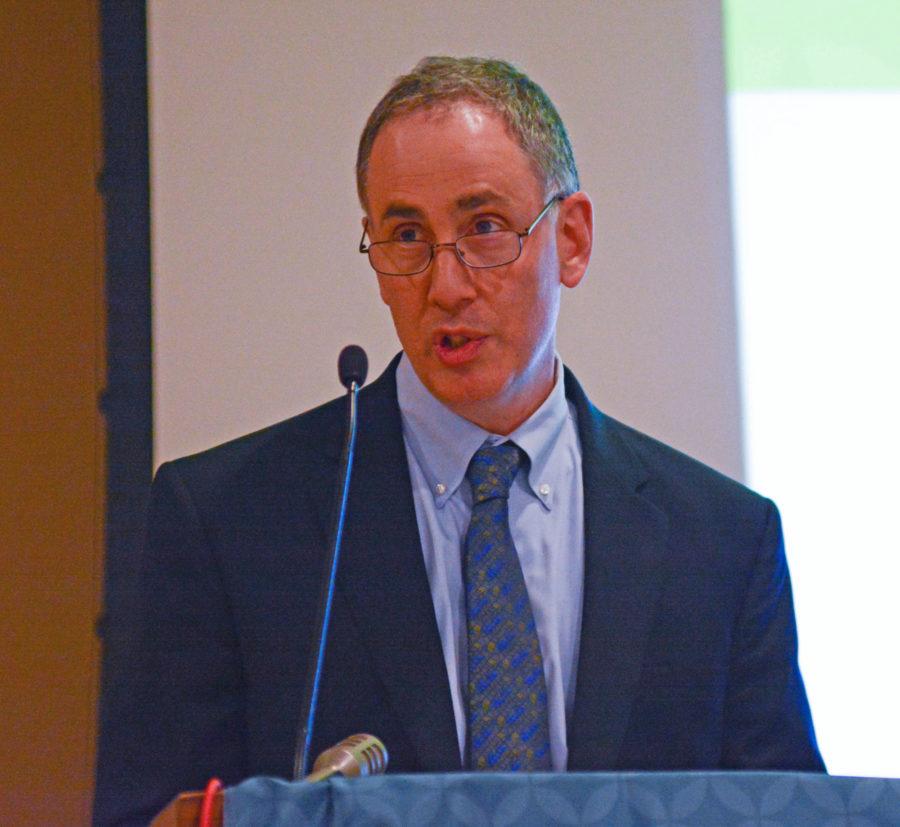UI hopes to reach carbon-netural goal 12 years early
Vice Chancellor for Research, Peter Schiffer discusses the goals and structure of The Illinois Climate Action Plan at the Illini Uinion, on Oct. 21, 2015.
Oct 21, 2015
Last updated on May 5, 2016 at 08:18 p.m.
McCall, associate director for campus sustainability, introduced speakers who presented their objectives and areas of specialization at the Illinois Climate Action Plan Forum at the Illini Union Wednesday. He also spoke about the goals of the plan, iCAP.ch
“We want to position Illinois as a world leader in sustainability,” he said. “It’s a big job to get to zero.”
The plan outlines a strategy for the reduction of the emissions of greenhouse gases on the University’s campus and as well as the reduction of the Illini carbon footprint. The plan was originally implemented in 2010.
Get The Daily Illini in your inbox!
The University currently spends $98.8 million each year on utilities and energy services for the campus, according to a draft of the iCAP document. The plan will use funds from the campus utilities budget, the central campus budget and external grants, but the bulk of the funding will come from the Campus Revolving Loan Fund, McCall said.
Most of the speakers at the forum were involved with the Energy Conservation and Building Standards Sustainability Working Advisory, or SWATeam. The SWATeam works in conjunction with iCAP and consists of small teams that focus on specific aspects of sustainability at the University. The subgroups include energy generation, purchasing and distribution, water and stormweather, purchasing waste and recycling, agriculture, land use, food and sequestration, among others.
Scott Willenbrock, professor in the department of physics, discussed the plan in relation to energy generation, purchasing and distribution subgroup and focused on goals regarding clean wind energy.
“Roughly 50 percent of energy on (the University’s) grid is coal-based,” Willenbrock said.
But, he said, the percentage is decreasing. Willenbrock’s subgroup is looking into the possibility of using wind energy off campus.
“The area on campus that meets all the requirement for wind turbines is very small,” he said. “We can choose to buy wind energy as much as we want; it may cost more, but we can make that choice.”
Several students also spoke at the forum regarding their specific SWATeam subgroups’ goals.
Amy Liu, junior in FAA, spoke about the water and storm weather subgroup regarding plans to improve in areas of water conservation. Liu said “the idea of working with students” is a common area of concentration in the plan. She said the group will try to obtain and publicize more granular water use data by fiscal year 2016, including water quality.
The forum ended with a call to action from Nishant Makhijani, a sustainability engagement specialist with the Institute for Sustainability, Energy and Environment.
He stressed the idea of involving the entire campus in the effort to reduce the Illini carbon footprint. Makhijani even noted that students may be offered class credit if they “want to work on a sustaining project.”
Makhijani made a point of noting the importance of faculty involvement in the campus-wide call to action for sustainability.
“Students have a lot of ideas, a lot of potential, but we need faculty and staff’s assistant as well,” said Makhijani.






